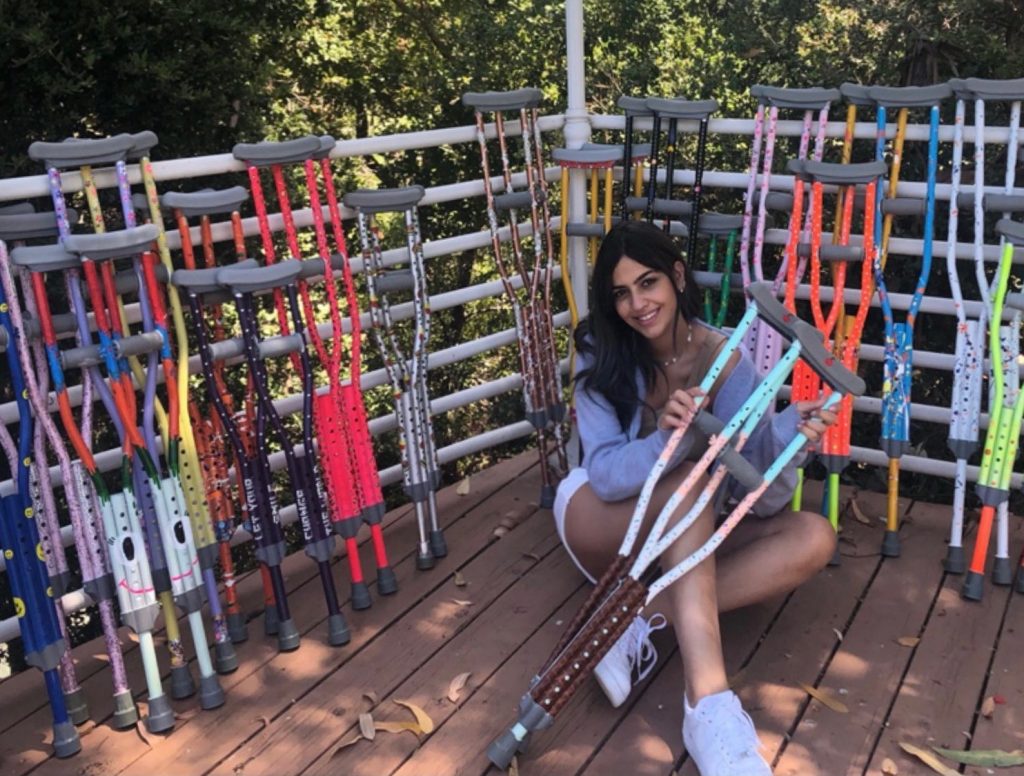When in-person classes at Binghamton University ceased in March due to COVID-19, BU student Natali Avshalomov, a senior majoring in human development, founded the “Walking on Sunshine Project.” The project works with nonprofits to decorate, deliver and donate crutches to charitable organizations for children in disadvantageous positions.
Avshalomov has currently completed one round of donations to fund the project. Avshalamov’s project received widespread media attention, including coverage on Good Morning America and Yahoo! News. Recently, she received the “Top 100 Healthcare Leaders” award by the International Forum on Advancements in Healthcare (IFAH).
Avshalomov expressed how she found inspiration during the COVID-19 pandemic, which caused the cancellation of her planned summer internship at a doctor’s office.
“This whole thing started as a quarantine idea,” Avshalomov said. “I thought I was just going to be doing it when I had the free time due to classes being online. But, thankfully with the support that I’ve gotten, I decided to pursue it biannually, so now the project is going to continue every winter and summer season.”
Udi Avshalomov, Natali Avshalomov’s father, explained how the project began.
“What impressed me the most with this project is that it went from Natali talking about this, and, next thing I know, we are at Home Depot mid-pandemic, masks, gloves and long lines, got paint etc.,” Udi Avshalomov wrote in an email. “Three days later, a truck of crutches shows up at our door, and she never stopped working since. While we were all depressed, since COVID-19 was going on, Natali was out there ‘fighting the good fight.’ Our whole neighborhood was lifted by this girl.”
Avshalomov is on a premed track for her major, which served as motivation and gave her a new perspective on the project.
“I think my major, human development, is the motivation behind this,” Avshalomov said. “Human development focuses on communities and groups that are marginalized, and the pre-health track at [BU] gives me the medical side. So, the two work together in allowing me to apply sociology to a health care field.”
Motivated by multiple passions and support from her family and friends, she decided to pursue the project and added her own flair to the concept.
“In the future, I want to work in orthopedics or podiatry, and I tend to bedazzle or collage random things in my home,” Avshalomov said. “I thought of the idea to decorate medical devices and equipment. It was a smaller idea in my head, and, once I shared it with family and friends, that served as the motivation to go for it straight away and not wait until I’m older.”
Avshalomov collected money and funds through a GoFundMe account and Venmo, using social media. With the help of family and friends, Avshalomov said she raised around $720 dollars in two days. With that money, she purchased crutches and art supplies, then began decorating. According to Avshalomov, the crutches are made to match various children’s interests and include designs such as Pac-Man, splatter paint and ice cream cones.
Avshalomov discussed how she came to focus specifically on crutches, though she may have more plans for the future.
“I did research online on health care disparities and was able to find out about durable medical equipment (DME),” Avshalomov said. “There are nonprofit organizations that specialize in collecting DME, so once I found out that term I educated myself on what consists of [DME]. I decided to stick with crutches, but I have been thinking about expanding it to other DME in the future.”
Avshalomov listed positivity, mobility and accessibility as the main tenets of her project.
“Positivity in that the crutches that are being donated are decorated and customized in colorful and funky patterns,” Avshalomov said. “Mobility, in the fact that these are mobile devices and medical equipment being donated to ensure that children can be active in their childhood. Accessibility in that the whole mission of the project is to increase accessibility to medical equipment.”
Avshalomov hopes to expand her project into involving volunteers as well as working with additional types of DEM, such as walkers, canes and arm braces. She also hopes to adopt a more sustainable approach once COVID-19 is over by holding crutch drives.
Avshalomov described how BU students can find inspiration to start their own projects.
“I would tell BU students to let their mind wander — whether it’s a passionate idea or one for social change,” Avshalomov said. “Think about the general theme of the idea, don’t think about everything that can stop you from completing it. Go for it and see what happens.”



